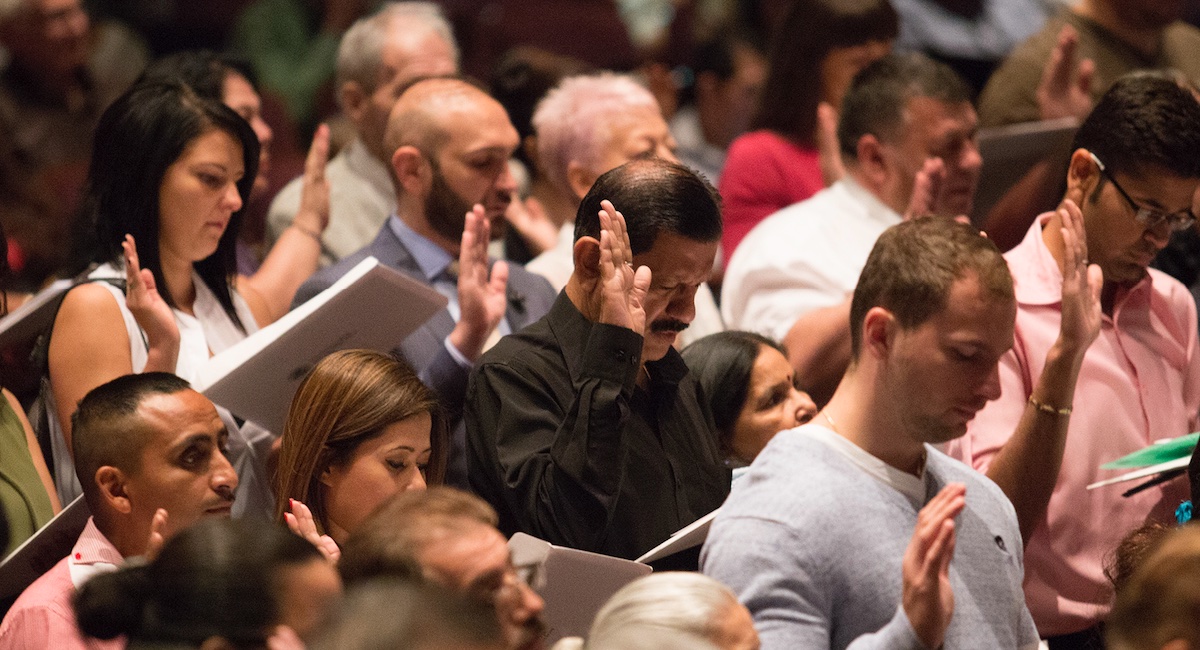President Trump’s challenge to unrestricted birthright citizenship continues a world-historical debate: Who gets to be included in a nation?
The SCOTUS hearing
The case, heard by the Supreme Court on Thursday, concerns whether lower courts may freeze presidential orders for the entire country — in this case Executive Order 14160, issued on Trump’s first day in office, denying U.S. citizenship to babies born to a mother who is either illegally present in the U.S. or has legal temporary status, and a father who is neither a citizen nor a legal permanent resident.
In response, federal justices of Washington, Maryland and Massachusetts issued nationwide injunctions blocking enforcement of the order.
At the over-two-hour hearing, several justices debated on the one hand the ability of individual district judges to override presidential executive actions nationwide, which may violate the scope of judicial power under Article III of the Constitution; and on the other, the legality of President Trump’s order to deny automatic birthright citizenship to U.S.-born babies, which may violate the 14th Amendment of the Constitution and long-held Supreme Court precedent.
The case involves three different lawsuits spanning 22 US states and many immigration advocacy groups.
Five of the six conservative-majority judges on the court — three of which Trump appointed in his first term — signalled openness to backing the president in limiting lower courts from issuing nationwide injunctions.
The judges also expressed major reservations over upending more than a century of interpretation of the 14th Amendment as ensuring citizenship to all U.S.-born or -naturalized people, regardless of parental immigration status.
As of 2024, an estimated 5.5 million U.S.-born children live in households with at least one undocumented resident, including 1.8 million with two undocumented parents.
Justice Kavanaugh, a key conservative vote, strongly suggested that class-action lawsuits may suffice for challengers to Trump’s executive order to win, given that certifying a class action requires judges to consider who may be affected by a court’s ruling and how — a much higher hurdle than simply reviewing a policy, as the current challenges involve.
“So they’re taking a grave risk, so to speak, by proceeding through a class action, and it has this symmetry where the government is bound if we lose, they are bound if we don’t lose,” explained Trump’s Solicitor General D. John Sauer at the hearing. “And that’s a very, very important distinction.”
The Supreme Court is expected to rule in late June or early July.
‘Blood and soil’
Globally, birthright citizenship is by blood through a citizen parent, by a doctrine called ‘jus sanguinis’ associated with the post-revolutionary French Civil Code.
In the U.S., birthright citizenship was codified in 1868 after the Civil War, when the 14th Amendment was added to the Constitution.
The amendment, known as the Citizenship Clause, states that “ll persons born or naturalized in the United States, and subject to the jurisdiction thereof, are citizens of the United States and of the State wherein they reside.”
The clause was intended to overrule the 1857 case Dred Scott v. Sandford, in which the Supreme Court ruled that Scott, a Virginia-born slave from Missouri brought to U.S. territories where slavery was illegal, was not a citizen and therefore not entitled to sue or be protected in federal court.
Four decades later in the 1898 case United States v. Wong Kim Ark, the Supreme Court ruled that Wong — a San Francisco-born Chinese American barred by immigration officials from re-entering the U.S. after a trip to China — was a U.S. citizen.
Legal critics throughout history, from the Wong case through Thursday’s hearing, argue that this interpretation of the 14th Amendment to guarantee automatic citizenship to all U.S.-born people leaves too open the question of what “subject to the jurisdiction” of the U.S. means.
In one of at least four briefs filed by the U.S. Department of Justice opposing lower court injunctions freezing Trump’s birthright executive order, lawyers argued that the Wong case hinged on Wong’s parents being U.S. permanent residents; in contrast, Trump’s case hinges on U.S.-born children of undocumented immigrants and temporary visitors who, the lawyers wrote, were not subject to U.S. jurisdiction because they are at least permanent residents of, and owe “a measure of allegiance to,” their “parents’ home country.”
Only 35 of the world’s 195 countries offer unrestricted birthright citizenship as the U.S. does, and other than Chad, Lesotho and Tanzania, all are in the Western Hemisphere.
Approximately 40 more countries — among them Australia, South Africa, India, Egypt, Japan and much of Europe — offer a restricted form of birthright citizenship dependent on parents’ legal status or length of residency.
Despite its relative global rarity, this core doctrine of American identity is arguably as old as Western civilization itself.
In the early Roman Republic, citizenship was automatically granted by birth to Roman citizens, later being expanded to residents of allied Latin cities and conquered territories, although full citizenship was limited to free-born men.
Ancient Greek laws also generally granted automatic citizenship to free men born of Greek citizens, although women, slaves and sometimes non-property-owning men were generally excluded.
Recent decades have seen several countries restrict or abolish birthright citizenship, including Britain, Ireland, Australia, New Zealand and India.
Critics of birthright citizenship say it encourages birth tourism, a practice by which expectant mothers travel to the U.S. on a legal visa to gain automatic citizenship for their child, then return home or to a third country.
As of 2020, an estimated 20,000 to 26,000 birth tourists come to the U.S. annually.
Were the Supreme Court to rule in favor of Trump’s order, these children would no longer be considered citizens.
Such a ruling would also mark a break with 127 years of standard Constitutional interpretation, removing the U.S. from the ranks of the few nations offering automatic birthright citizenship at all.





